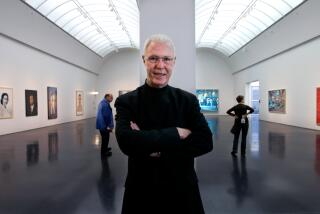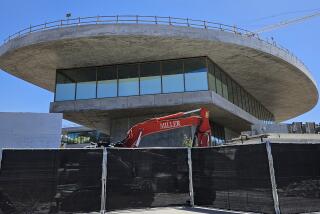Arts World Waiting to See If O’Connor Can Deliver Festival
- Share via
Pleased by the prospect of money and prestige that could come their way during the “year of the arts” proclaimed by Mayor Maureen O’Connor, San Diego arts groups settled down Tuesday to watch whether O’Connor can fulfill that promise and deliver on her plan for a monthlong arts festival from the Soviet Union.
O’Connor made the announcement of the festival at her State of the City address Monday night, declaring that she and a delegation of the city’s arts leaders will travel to Moscow this year to bring back that country’s finest artists. In exchange, the mayor’s office said, some of San Diego’s best artists would travel to Moscow or Leningrad.
“I’m glad she’s taking the arts on as a major interest,” said Danah Fayman, president of the San Diego Foundation for the Performing Arts. “I’m just waiting to see what it all means.
Money Would Be Needed
“I think it remains to be seen the type of thing they’re proposing, the quality and so forth. . . . I just know it’s easy to talk about and not easy to do. It takes a lot of money and a lot of commitment to follow through and see that we get the best,” Fayman said.
Jack Borchers, executive director of COMBO, the county’s major private-arts funding agency, said, “I haven’t the slightest idea as to the mechanics of doing something like (the festival), but it’s certainly worth an effort. I applaud her for thinking about this and addressing the arts in San Diego and their development.”
Hailing 1988 as the year of the arts, O’Connor said in her address that negotiations are under way with the Soviets to bring “the finest representation of Russian culture--in dance, art, music, ballet and folk arts” to San Diego for a festival in 1989 or 1990.
Mayoral spokesman Paul Downey said Tuesday that the mayor hopes to bring the Bolshoi Ballet, the Grand Gorky Theatre and a Russian collection of Impressionist paintings to San Diego.
Performers from the Old Globe Theatre or artworks from the San Diego Museum of Art might be exported to the Soviet Union in return, Downey said.
O’Connor, Downey, City Manager John Lockwood and City Attorney John Witt will attend a meeting at the Soviet consulate in San Francisco on Friday to begin work on the details, Downey said.
In the next few weeks, O’Connor will select the delegation that will accompany her to Moscow to formalize arrangements for the arts festival, Downey said.
But as the stardust from Monday’s speech settled Tuesday, enthusiasm for the mayor’s proposals was tempered by questions about how she plans to accomplish and pay for them.
Concern Is Expressed
“The mayor thinks we can do it,” Councilwoman Judy McCarty said. “She has traveled through Europe and she says we can do it. I have some concern about how we will pay for it.”
“I’d be very interested to know” how the projects will be paid for, she continued. “I should think it will be one of her first priorities to let us know. I would think we would get a report on the specifics fairly soon.”
Downey said one possible funding source for the festival is the city tax levied for hotel stays, known as the transient occupancy tax. But Councilman Ed Struiksma questioned the use of such public funds that could be spent elsewhere, for an arts festival.
Struiksma also claimed that the mayor’s call for a City Charter amendment limiting council members and the mayor to two four-year terms in office is aimed directly at him. Struiksma is considering a run for mayor against O’Connor this year.
“I’m the only council person who at the conclusion of this term (in 1989) will have served two complete four-year terms on the council,” Struiksma said. “Obviously, I look at the proposal and I realize that (O’Connor’s) always looking over her shoulder. And when she looks over her shoulder, she sees me.”
Freshman council member Bob Filner endorsed O’Connor’s arts theme, praising the mayor for “elevating her gaze” above the day-to-day issues that she and the council will face routinely.
“There’s no way we can avoid the crises and the day-to-day things, whether it’s traffic or sewage or trash,” Filner said. “But we ought to be elevating our gaze, and that’s what she did.”
O’Connor won’t be the first San Diegan to engage in a cultural exchange with the Soviet Union.
In December, the La Jolla Playhouse announced that its artistic director, Des McAnuff, has accepted an invitation to direct a play in fall 1988 at the Sovremennik Theatre in Moscow, making him apparently the first American to direct a Soviet theatrical company.
County Plan Shaky
Meanwhile, another arts venture that O’Connor noted prominently in her address--converting the County Administration Building to a cultural arts center--appears to have little hope of success in the near future, County Supervisor George Bailey said, noting that the city owns neither the building nor the land it sits on. The county owns both, but the city does control the zoning on the parcel.
“I don’t think she has the support of the majority of the board (of supervisors),” said Bailey, chairman of the supervisors. “I think this building has the reputation of standing for government and that’s what it should continue to be for. . . . At this point, it’s just wishful thinking.”
Calling the building “the grand dame” of the city’s architecture, O’Connor envisioned an open space or parkland where the building’s parking lots now stand between Harbor Drive and Pacific Coast Highway.
Instead of asphalt, O’Connor said, she envisions botanical gardens, reflecting ponds and a forest of small trees. Inside, the building that now houses civil servants, would be converted to a “municipal art gallery, a small tropical fish aquarium or an intimate performing arts stage.”
Architect Douglas Austin, president of the architectural firm of Austin, Hansen and Fehlman, said that a conversion that includes an aquarium would be an extremely expensive, difficult proposition but that “an art gallery is probably more within the realm of possibility. You’re not talking about the sophisticated structural systems or the weight the water produces.”
Conversion of the parking lots, even if they included construction of subterranean garages, is a much more realistic proposal, Austin said.
“Her dream may be stretching it a bit, but I want to compliment her for at least being creative a bit,” Austin said.
Ironically, Susan Golding, the politician mentioned most frequently as O’Connor’s opponent in this year’s mayoral election, supports the idea.
Golding said she has brought forth similar proposals over the past three years but is unsure whether support for the venture exists.
But Golding criticized O’Connor for saying that “to permit the wrecking ball to touch this historical building would bring shame on us all.” Golding said all five members of the Board of Supervisors have committed themselves to preserving the administration building.
More to Read
The biggest entertainment stories
Get our big stories about Hollywood, film, television, music, arts, culture and more right in your inbox as soon as they publish.
You may occasionally receive promotional content from the Los Angeles Times.










